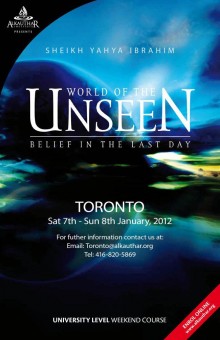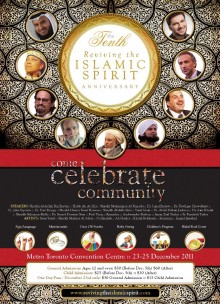World of the Unseen – Sheikh Yahya Ibrahim
Posted in EventsDecember 3, 2011No comments

Posted in Daily IslamDecember 3, 2011No comments
Narrated ‘Uqba bin ‘Amir: We staid to the Prophet, “You send us out and it happens that we have to stay with such people as do not entertain us. What do you think about it? He said to us, “If you stay with some people and they entertain you as they should for a guest, accept their hospitality, but If they don’t do, take the right of the guest from them.”[Bukhari 043:641]
Posted in Daily Islam,EventsDecember 3, 2011No comments
Ashura is 10th of Muharram, and in our case will be on Tuesday, December 6, 2011. (Remember that Islamic days begin after Maghrib, so 10th of Muharram will be from Maghrib on Monday, Dec. 5 till Maghrib Tuesday, Dec. 6)
Practices To Be Observed On The Day of Ashura (10th of Muharram.)
1. To fast on the 9th and 10th or the 10th and 11th of Muharram.
a. This is a nafl fast.
b. The act of fasting is sunnah.
2. To spend freely on one’s family (without incurring debt and being wasteful.)
Rasoolullah (sallallahu alayhi wa sallam) said:
“He who will be generous on his family on the day of Ashura, Allah Ta’ala will be generous on him for the entire year.” (Tabrani, Baihaqi).
Posted in Daily IslamDecember 2, 2011No comments
`Umar ibn Khattab (Allah be well pleased with him) said:
“As we were sitting one day before the Messenger of Allah (peace and blessings be upon him), a man suddenly appeared. He wore pure white clothes and his hair was dark black—yet there were no signs of travel on him, and none of us knew him.
He came and sat down in front of the Prophet (peace and blessings be upon him), placing his knees against his, and his hands on his thighs. He said, “O Muhammad! Tell me about Islam.”
The Messenger of Allah (peace and blessings be upon him) replied, “Islam is to bear witness that there is no god but God and that Muhammad is the Messenger of God; and to perform the prayer; pay zakat; fast Ramadan; and to perform Hajj to the House if you are able.”
The man said, “You have spoken the truth,” and we were surprised that he asked and then confirmed the answer.
Then, he asked, “Tell me about belief (iman).”
The Prophet (peace and blessings be upon him) replied, “It is to believe in Allah; His Angels; His Books; His Messengers; the Last Day; and in destiny—its good and bad.”
The man said, “You have spoken the truth. Now, tell me about spiritual excellence (ihsan).”
The Prophet (peace and blessings be upon him) replied, “It is to serve Allah as though you behold Him; and if you don’t behold him, (know that) He surely sees you.”
“Now, tell me of the Last Hour,” asked the man.
The Prophet (peace and blessings be upon him) replied, “The one asked knows no more of it than the one asking.”
“Then tell me about its signs,” said the man.
The Prophet (peace and blessings be upon him) replied, “That slave women give birth to their mistresses; and that you see barefoot, unclothed, beginning shepherds competing in the construction of tall buildings.”
Then the visitor left, and I waited a long time. Then the Prophet (peace and blessings be upon him) asked me, “Do you know, Umar, who the questioner was?”
I replied, “Allah and His Messenger know best.”He said (Allah bless him and give him peace), “It was Jibril. He came to you to teach you your religion.” [Sahih Muslim]
Posted in Daily IslamDecember 2, 2011No comments
By
Raveena Aulakh
Staff reporter
The Toronto Star
Islam does not condone domestic violence. The Qur’an does not sanction the idea of honour killings.
This is the loud and clear message from almost 60 prominent Muslim organizations, dozens of community leaders and activists from all over Canada, and a sermon that will be delivered from mosque pulpits next Friday even as the high-profile Shafia trial continues in Kingston.
“This is a call to action within the Muslim community,” said Samira Kanji, CEO of Noor Cultural Centre in Toronto. “We want to make sure that no one can cite Islam as validation over horrific crimes or rights over anyone else.”
It’s the first time since the London bombings in July 2005 that this many community leaders and organizations have come together in Canada to issue a statement and tackle a problem head-on.
The Shafia trial was one reason for “this call to action within the Muslim community,” said Kanji. “But it was a conglomeration of events.”
Domestic violence is a huge problem everywhere and the Muslim community has its share, she said. “But it’s important to tell people that Islam doesn’t sanction it.”
The Shafia trial has captured headlines nationwide.
The bodies of sisters Zainab, 19; Sahar, 17; and 13-year-old Geeti Shafia were discovered with their polygamist father’s first wife, Rona Amir Mohammad, 50, in a car in the Rideau Canal in June 2009.
The girls’ parents, Mohammad Shafia, 58, and Tooba Mohammad Yahya, 41, and their son Hamed Mohammad Shafia, 20, face first-degree murder charges.
In recent days, sordid details have unfolded in the case, including a wiretap in which Shafia, the girls’ father, was heard saying that even if he is hoisted to the gallows, nothing is more important than his honour.
“They betrayed us. They betrayed Islam. They betrayed everything,” Shafia says in the recorded conversation.
Accounts of the trial have been disturbing for Sikander Ziad Hashmi, imam at the Islamic Society of Canada in Kingston.
There should be no ambiguity about the position of the community about so-called honour killings, he said. “We needed to be clear … to tell everyone that this is wrong. Islam does not condone it.”
Among other things, the special sermon says, “Domestic violence and, in the extreme, practices such as killing to restore family honour violate clear and non-negotiable Islamic principles.”
Nobody should take what comes out of this trial as having its source in Islam, Hashmi added.
Many Canadians will recognize that the trial and its tragic nature are not representative of what mainstream Islam is about, said Ihsaan Gardee, executive director of Canadian Council on American Islamic Relations-Canada.
“It boils down to what it is: a horrific crime,” he said.
The common sermon next Friday is the first step in tackling the issue of domestic violence. Community leaders plan to make resources available for mediation, conflict resolution and domestic violence.
“We want to organize workshops at different mosques,” Kanji said. “Fighting this … is a firm commitment and we are giving it priority.”
Posted in Daily IslamDecember 1, 2011No comments

Before I genuinely began to cultivate and nurture my relationship with God, I regarded the five daily prayers that Islam enjoins on believers as laborious. It seemed impractical to expect that I would be able to stop what I was doing during my busy work schedule to take time out and pray.
Working as a news wire journalist, I was often spending upwards of 10 hours a day in the office or at conferences, interviews and meetings, barely able to make time for a lunch break. If I wasn’t working, my time was divided between house chores, errands, family and friends, and exercise. I was punctual with everything in my life, except that I was late five times a day.
In my mind, it was not viable to expect that I could wake up before the crack of dawn to pray the early-morning prayer, fajr, otherwise I would be too tired to work effectively later that morning. It also seemed inefficient to interrupt my work meetings to pray duhr, the mid-day prayer, and asr, the afternoon prayer.
Making the sunset prayer maghrib was often a challenge because the window to pray is typically quite short and coincides with the time between finishing work, having dinner and returning home. So, in effect, the only prayer that was feasible for me to pray on time was isha, the evening prayer. For most of my life, thus, I would at best pray all five prayers in the evening, or skip prayers here and there to accommodate my immediate commitments.
Posted in Daily IslamDecember 1, 2011No comments
“And indeed they have led many astray. And (O Allâh): ‘Grant no increase to the Zâlimûn (polytheists, wrong-doers, and disbelievers, etc.) save error.’ ”
Posted in Daily IslamDecember 1, 2011No comments
Prophet Muhammad (sallallaahu ’alayhi wa sallam) said,
“Whenever sexual permissiveness spreads among the people until it becomes declared, infections and killing diseases, as well as illnesses not previously found in their ancestors will spread among them”
(Narrated by Ibn Majah)
World Aids Day is observed today by the non muslims who dedicate this day for raising awareness about the deadly disease of Aids. Aids has killed more than 25 million people and more than 33.2 million people worldwide live with HIV, making AIDS one of the most destructive epidemics in the history of mankind. But just raising awareness about a certain thing is not the solution, but finding the root cause is. The Prophet (sallallaahu ’alayhi wa sallam) warned us about this and it is a clear sign for the whole world that if we move away from the teachings of Islaam than more deady plagues will occur.
In another Hadith which is reported by Malik, the Prophet (sallallaahu ’alayhi wa sallam) said, “Whenever adultery becomes a widespread phenomena among certain people, death will spread among them.” Islaam blocks all the roots that will lead to the problem of such deadly diseases. Allah says in the Qur’aan : “And come not near to Zina (fornication). Verily, it is a Fahisha (i.e. a great sin) and an evil way.”
(The Holy Qur’aan 17:32)
In the “so called modernization” we have left the teaching of Islaam but can we tihnk that we can get away with anyting, no we cannot! It will only invite the wrath of Allaah, “Verily, the punishment of your Lord is severe.” (The Noble Qur’aan 85:12)
Therefore let us learn from the pain and devastation of AIDS the lesson that the Hudood (limitations) set up by Allaah, the Almighty must be followed strictly.
Doesnt it hurt you that so many Non Muslims are dying daily because of Aids? Have you ever invited them to the Path of Allaah and shown them its benefits?
Please share this Hadith will everyone Non Muslim you can, Jazak’Allaah.
Posted in Daily IslamDecember 1, 2011No comments

Sunnah according to AL-Mawrid Institute of Islamic Sciences
Literally means well trodden path(Tariqah) in Arabic.
Are those Abrahamic practices and rituals that were adopted and revived (Hajj) by the Prophet Mohammad (pbuh), in some cases after modifications (Fatiha in salaah) and additions (Eidayaan), and instituted among his followers as integral part of God’s religion.
Sunnan have been transferred and established by the Prophet Mohammad (pbuh), through practical demonstration to his Companions.
From the companions, these practices have been transmitted uninterrupted through successive generations of Muslims with consensus and practical perpetuation to date.
They have reached us through the same mechanism of history. The Qur’an has reached us by verbal (documentary) transmission whilst the Sunnah by practical transmission.
What is Hadith?
Hadith literally means a saying or something new. In Islamic terminology, it is defined as the individual-to-individual narratives ascribed to the Prophet (pbuh) regarding his sayings, actions, expressed or tacit approvals, his life history and personal description.
It includes
Life history of Prophet Mohammad (pbuh), including his meetings with people, important events in his time e.g. Holy wars as narrated by his followers.
Record of the Prophet Mohammad’s (pbuh) everyday life, rituals and routines, these are those things that he liked but did not authorise their initiation as essential part of religion. These records reveal the Prophet’s (pbuh) excellent example (Uswa Al Hasana) in carrying out the directives of Islam.
Record of answers to questions and explanations given by the Prophet (pbuh) to his followers.
Record of any explanations about commandments in the Qur’an and the Sunnah by the Prophet (pbuh) to his followers
Posted in Daily IslamDecember 1, 2011No comments
Prophet Mohammad (peace and blessing be upon him) said: “It is not part of [the tradition of] my Ummah [the behaviour of] one who does not honour our elder and show mercy to our youngster and know for our scholar his due right.” [Ahmad & Tabaraani]
Posted in Daily IslamDecember 1, 2011No comments
Verily, those who divide their religion and break up into sects (all kinds of religious sects), you (O Muhammad “salallahu alayhi’walsam) have no concern in them in the least. Their affair is only with Allâh, Who then will tell them what they used to do.(6:159)
Posted in Daily IslamDecember 1, 2011No comments
Allah’s Apostle (sallallähu alaihi wasallam) said, “Do good deeds properly, sincerely and moderately and know that your deeds will not make you enter Paradise, and that the most beloved deed to Allah’s is the most regular and constant even though it were little.”
[Bukhari Book:76 No:471]
Posted in Daily IslamDecember 1, 2011No comments
WHO WAS JESUS
Islam honors all the prophets who were sent to mankind. Muslims respect all prophets in general, but Jesus in particular, because he was one of the prophets who foretold the coming of Muhammad. Muslims, too, await the second coming of Jesus. They consider him one of the greatest of Allah’s prophets to mankind. A Muslim does not refer to him simply as “Jesus,” but normally adds the phrase “peace be upon him” as a sign of respect.
No other religion in the world respects and dignifies Jesus as Islam does. The Quran confirms his virgin birth (a chapter of the Quran is entitled “Mary”), and Mary is considered to have been one of the purest women in all creation. The Quran describes Jesus’ birth as follows:
“Behold!’ the Angel said, God has chosen you, and purified you, and chosen you above the women of all nations.”
[Noble Quran 3:42]
“Mary, God gives you good news of a word from Him, whose name shall be the Messiah, Jesus son of Mary, honored in this world and in the Hereafter, and one of those brought near to God. He shall speak to the people from his cradle and in maturity, and he shall be of the righteous. She said: “My Lord! How shall I have a son when no man has touched me?’ He said: “Even so; God creates what He will. When He decrees a thing, He says to it, ‘Be!’ and it is.” [Noble Quran 3:45-47]
Muslims believe that Jesus was born immaculately, and through the same power which had brought Eve to life and Adam into being without a father or a mother.
“Truly, the likeness of Jesus with God is as the likeness of Adam. He created him of dust, and then said to him, ‘Be!’ and he was.” [Noble Quran 3:59]
During his prophetic mission, Jesus performed many miracles. The Quran tells us that he said:
“I have come to you with a sign from your Lord: I make for you out of clay, as it were, the figure of a bird, and breathe into it and it becomes a bird by God’s leave. And I heal the blind, and the lepers, and I raise the dead by God’s leave.” [Noble Quran 3:49]
Muhammad and Jesus, as well as the other prophets, were sent to confirm the belief in one God. This is referred to in the Quran where Jesus is reported as saying that he came:
“To attest the law which was before me, and to make lawful to you part of what was forbidden you; I have come to you with a sign from your Lord, so fear God and obey me.”
[Noble Quran 3:50]
Prophet Muhammad emphasized the importance of Jesus by saying: “Whoever believes there is no god but Allah, alone without partner, that Muhammad is His messenger, that Jesus is a servant and messenger of God, His word breathed into Mary and a spirit emanating from Him, and that Paradise and Hell are true, shall be received by God into Heaven. [Bukhari]
Posted in EventsNovember 30, 2011No comments

“Reviving the Islamic Spirit” convention is an attempt by the youth to help overcome new challenges of communication and integration. The convention aims to promote stronger ties within the North American Society through reviving the Islamic tradition of education, tolerance and introspection, and across cultural lines through points of commonality and respect.
Furthermore, the convention will be a celebration of our identity and Islamic faith. To help attain these ideals, the convention will feature a wide range of voices from various parts of the world.
The convention showcases Islamic leadership from across the globe sharing a common platform before the widest cross section of our community. This program hopes to empower the youth across North America and inspire a true revival.
www.revivingtheislamicspirit.com
Posted in Daily IslamNovember 30, 2011No comments
He is Allah , other than whom there is no deity, the Sovereign, the Pure, the Perfection, the Bestower of Faith, the Overseer, the Exalted in Might, the Compeller, the Superior. Exalted is Allah above whatever they associate with Him. (59:23)
Posted in Daily IslamNovember 30, 2011No comments
The Islamic lunar calendar begins with the holy month of Muharram. Muharram is amongst the months which are classified under the term Ashhur-ul-Horom “sanctified months.” Allah has stated in the Glorious Qur’an “The number of months, according to Allah is twelve months (which is mentioned) in the book of Allah on the day in which We created the heavens and the earth. Amongst these twelve months, four are sanctified; that is the right religion. So do not wrong yourselves’ therein,” (9:3).
The four months according to authentic traditions are Muharram, Rajab, Zul Qadah, and Zul Hijjah. It has been reported that Rasulullah (saw), on the occasion of the last sermon (hajjat-ul-wada), addressed the Sahabah (ra) saying, “One year consists of twelve months, out of which four are sanctified. Three of them are in sequence: Zul Qadah, Zul Hijjah, Muharram, and the fourth is Rajab. (Bukhari)
The eminent commentator (mufassir) Ibn Katheer has written in his commentary (tafseer), “Allah has declared these four months sanctified and has increased their sanctity. He declared a sin therein more severe and has increased the virtue and reward of good deeds as well” (Ibn Katheer, Vol.2): The scholars of Islam have stated that the actions performed in these months have a great effect on the person as to what they will do, throughout the remainder of the year.
FASTING DURING THE MONTH OF MUHARRAM:
It has been reported by Ali (ra) that a man came to Rasulullah (saw) and asked, “0 Prophet of Allah! During which month should I fast after the month of Ramadan?” Rasulullah (saw) replied, “If you are to fast in any month other than the month of Ramadan, fast during the month of Muharram, because it is the month of Allah. There is a day in this month in which a whole nation was forgiven and wherein Allah will forgive another nation,” (Tirmidhi H. 683).
THE ORIGIN OF THE FAST OF A’ASHURA: (10th MUHARRAM).
The word A’ashura is derived from the Arabic word which means ten in the English language. It has been named A’ashura because it is observed on the 10th of Muhharram. According to numerous authentic traditions, fasting on the day of A’ashura was initially obligatory upon the Muslims. However, it was made optional when Allah commanded the Muslims to fast throughout the month of Ramadan.
It has been reported by A’isha (ra) that when the Rasulullah (saw) came to Madinah, he fasted on the day of A’ashura and directed the people to fast on that day as well. However, when the fast of Ramadan was made obligatory, the obligation of fasting was confined to Ramadan, and the fast of A’ashura was made optional (Abu Dawood).
Nevertheless, Ibn Abbas (ra) relates, when the Prophet of Allah (saw) was informed that the Jews fast on the 10th of Muharram, Rasulullah (saw) asked them, “Why do you fast on this day?” They said, “This is the day when Sayyidna Musa (as) and his followers miraculously crossed the Sea, while Pharaoh was drowned in its water.” Upon hearing this Rasulullah (S.A.W) stated, “We are more closer to Musa than you.” He then directed the Muslims to fast on the day of A’ashura(Abu Dawood).
In addition to fasting on the 10th of Muharram, we should also fast on either the 9th or the llth. As Rasulullah (S.A.W) was informed that the Jews also fast on the 10th of Muharram, he said, “If I will be alive next year, I will also fast on the 9th of this month” (Muslim H. 1917).
VIRTUES OF FASTING ON THE 10th OF MUHURRAM:
Abdullah ibn Mas’ud (ra) relates that Rasulullah (saw) preferred the fast of A’ashura to the fast of other days and preferred the fast of Ramadan to the fast of A’ashura (Bukhari, Muslim).
Abu Qatadah (R.A) relates that Rasulullah (saw) said, “The fasting of the tenth of Muharram grants the forgiveness of one whole year,” (Tirmidhi H.683).
BEING GENEROUS TO ONES FAMILY ON THE DAY OF A’ASHURA:
Abdullah Ibn Mas’ud relates that Rasulullah (saw) stated, “Whosoever is generous to one’s family on the day of A’ashura, Allah will be generous (provide barakah) towards that person throughout the entire year,”(Razeen).
According to these types of traditions, one should be more generous to his/her family by providing more for them on the day of A’ashura as compared to other days. Although these traditions (above-mentioned tradition) are not very authentic according to the scholars of hadith, many other eminent scholars like Imams Ibn Hibban and Bahiqi have accepted them as reliable.
by Shaykh Fayaz Tilly